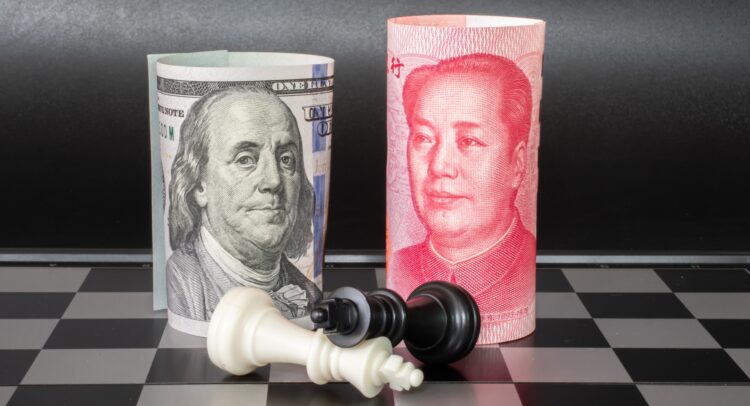The news of China dumping billions in U.S. Treasuries from its massive holdings has left some stock market investors wary, wondering what the impact will be. This is smart, as astute stock market investors should take a moment to understand how this impacts the whole financial “chessboard.” The economic reality is that nothing happens in a vacuum. So China’s actions have the potential to trigger a domino effect, and this can indirectly impact the stock market through a connected web of related and seemingly unrelated factors.
Discover the Best Stocks and Maximize Your Portfolio:
- See what stocks are receiving strong buy ratings from top-rated analysts.
- Filter, analyze, and streamline your search for investment opportunities with TipRanks’ Stock Screener.
Here are seven top concerns that have some U.S. stock market investors positioned with one finger on the sell button.
How China’s Selling Could Increase Interest Rates
A mass exodus by China from U.S. Treasuries could create a sudden surge in bond yields. This would result from the increase in supply from China’s sales without offsetting increases in demand. This is important for the stock market. The reason, of course, is that higher interest rates make borrowing more expensive for companies, potentially affecting their profitability and stock prices. This can all lead to a decrease in corporate profitability and, consequently, a decline in stock prices.
Dollar Strength and Exchange Rates
As China sheds its U.S. Treasury holdings that are denominated in dollars, the U.S. dollar’s value could weaken on the foreign exchange market. This is because China has been exchanging U.S. dollars for Renmimbi (RMB) or gold. This weakens the dollar, once again because of the added supply (without offsetting increases in demand). This might seem like a boon for U.S. exporters because it makes their products cheaper in overseas currencies.
However, the problem is that a weaker dollar makes imports more expensive, which could potentially fuel inflationary pressures. The Fed is resolved to fight against inflation and might then be forced to raise interest rates.
Geopolitical Tensions and Possible Collision Course
China’s decision to offload U.S. Treasuries could be interpreted as a response to geopolitical and economic tensions between the two superpowers. The move can further strain an already fragile relationship, potentially leading to trade disputes and protectionist policies. Needless to say, such developments would cast a dark cloud over the global economy, with the stock market likely feeling the brunt of the uncertainty.
Investment Case Weakening
If China’s selling spree leads to higher interest rates and borrowing costs for companies, the investment case for many stocks could become less compelling.
This is because, with debt becoming more expensive, companies might see a decline in profitability. As a result, investor appetite for stocks could decrease, potentially triggering a sell-off and a subsequent drop in stock prices.
Market Volatility
China’s actions could inject a dose of uncertainty into the stock market. Investors, ever sensitive to market jitters, might become more cautious and adopt a wait-and-see approach. This could lead to increased volatility, with the market experiencing sharper swings in both directions.
Remember, volatility doesn’t necessarily translate to a downward trend, but it can create a nerve-wracking environment for even the most seasoned investors.
Gold Flight to Safety
China’s move away from U.S. debt and its simultaneous accumulation of gold could be interpreted as a lack of confidence in the U.S. economy and its financial system. This could trigger a domino effect, with other investors following suit and seeking alternative assets perceived as safer bets. The upshot is that a potential decrease in demand for U.S. assets, including stocks, could lead to a decline in their prices.
Domestic Production Push Could Spur Inflation
In response to China’s actions, the U.S. might attempt to strengthen its “Made in America” position and lessen its reliance on other countries for essential goods. However, this shift towards domestic production could include higher production costs for labor or materials for U.S. companies.
That would lead to the problem of increases in consumer prices, which would further fuel inflationary pressures and potentially prompt the Fed to – you guessed it – raise interest rates.
Key Takeaway
While China’s offloading of U.S. Treasuries might not directly affect the stock market, it could have indirect effects through interest rates, exchange rates, geopolitical tensions, and market sentiment. It’s important to keep in mind that the stock market is a rollercoaster ride, and there are always ups and downs.









